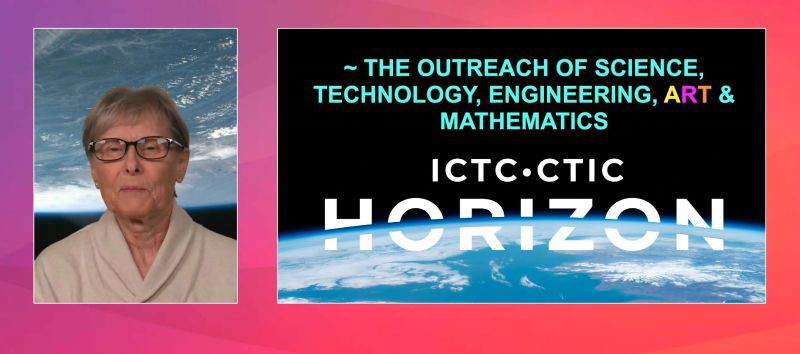Horizon 2022 — an Information and Communications Technology Council two-day virtual summit on Canada’s increasingly digital-led economy — kicked off this February 1 with curated content and thought leadership from over 80 guest speakers on business ideas, markets, policy, and best practices.
Nearly 2,000 attendees from around the world participated in the Horizon’s packed agenda, which included keynote presentations by Dr. Roberta Bondar, First Canadian Woman in Space; Johan Rockstrom, Internationally Recognized Scientist on Global Sustainability; Ron Keller the official Ambassador of the European Senate of Economy and Technology.
Over 20 panel discussions and breakout sessions tackled the future of work, smart communities, international digital trade and investment, tech in the green economy, gig work taxation, agtech, intellectual property, fiscal and financial measures, circular economy-and many other dimensions of the digitization of the economy.
Several French sessions featured national and international leaders, including one on the role of fintech in a growth economy moderated by ICTC Vice President Marc Lijour, and another moderated by ICTC President and CEO Namir Anani on fiscal and financial measures to drive innovation and sustainable and inclusive growth.
Here is a taste of some of the Horizon discussions.

Keynote speaker Dr. Roberta Bondar opened the summit with a view of technology’s awesome advances and our collective responsibility to guide tech to a better future. Bondar noted she grew up in a time of horse-drawn milk deliveries, juxtaposed that with the year 1992 when she became the first Canadian woman in space, and then shared a video of a helicopter flying through the rarefied atmosphere of Mars.
“It’s time to embrace a global community… with a layer of protectiveness and new ideas,” she said.
Maybe less impressive but undeniably as disruptive, the evolution and application of digital technologies in the economy empowers people, companies, and governments with new ways of connecting, greater efficiencies, better service delivery models, and solutions to complex problems that are compounded by climate change and a pandemic.
The Best Stuff
At the ground level, what drives this technology evolution are people with ideas and specific skills.
“But they have to be the [best] people,” said guest speaker, ICTC Board Chair and University of Calgary professor Tom Keenan in his presentation.
Beyond just technical skills, today’s ICT workers also need emotional skills, cross-disciplinary skills, and skills that take into consideration the ethical dimensions of technology development.
“What actually matters is your empathy,” Keenan said. “What matters is your authenticity and, a key point-the one that I will leave you with-is that those soft skills are not soft at all. They’re vital. And, more than that, they’re learnable.”
Skills and Cybersecurity
The skills demanded by cybersecurity provide an example. Aside from technical skills, cybersecurity professionals flex their communication skills and ability to work across departments and with C-suite management.
Hanna Bozakova of Tutanota spoke about the foundational importance of data security to the digital economy in a Horizon panel discussion. For companies, effective cybersecurity requires that the entire organization “understands the issues because, with security, there is no on/off switch.”
And that requires cybersecurity professionals to step up as part advocate and educator, motivating staff to become the front line of identifying and averting cyber attacks.
Opportunities to Learn Essential Skills
So-called soft but essential skills can be learned, as Keenan suggests, and tech students should seek out and take advantage of real-world opportunities to learn them. Work integrated learning for post-secondary graduates presents an ideal opportunity right at the outset of a career.
A panel discussion about ICTC’s WIL Digital work integrated learning program posed this question: why do students who take advantage of work integrated learning often end up with an advantage over graduates who attempt to jump straight into the workforce after graduating?
“It’s about being able to build those so-called elusive soft skills,” said Alexandra Cutean, Chief Research Officer, ICTC.
ICTC research confirms that work integrated learning provides important opportunities to test-run theoretical technical skills. More importantly, it immerses students in interactions with coworkers, clients, and bosses, which are steppingstones to becoming emotionally adept professionals.
Career Transitions
A panel discussion at the close of Horizon Day 1, moderated by ICTC president and CEO Namir Anani, also landed on the theme of the skills needed by the digital economy. Panelist Jeanette Sutherland of Calgary Economic Development (CED) highlighted the role of short-term skills development that allows people to transition into the digital economy.
Speaking about EDGE UP-a CED program developed in concert with ICTC, academic partners, and backed by an investment from The Future Skills Centre-Southerland explained how the initiative is training 320 professionals displaced from oil and gas sector for in-demand jobs in Calgary’s digital economy.
“Individuals now don’t need five years to re-engage with a new career opportunity. They can utilize their current skill sets, with some upskilling for these opportunities, if they are informed of where their skill sets are most closely aligned,” she said.
The key to the EDGE UP program’s success involves accurately identifying technical skills gaps and filling those gaps with targeted training. However, EDGE UP graduates also offer a wider package of skills to tech employers. As mid-career professionals and by virtue of the years spent in the workforce, EDGE UP graduates also offer business-world experience, a track record of working with people, adaptability, and agility.
